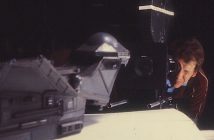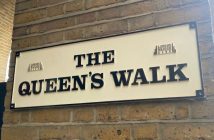Unless you are over 90 you will not have personal experience of fighting in a World War. This is a sobering thought for us all. My father, who is now 92, fought in WW2 having joined the RAF in 1938 aged 19 as a fighter pilot. He went on to fight in France and the Battle of Britain. He is “one of the few”. By contrast, when I was 19, at the end of the sixties, life was all about Jimi Hendrix, student rights, mini skirts, and parties. My dad’s early life could not have been more different and I often wonder how I would have coped in his shoes. He is no longer interested in the past as he lives for the present, enjoying life and the prospect of gathering the family together at Christmas in Ireland. Despite his personal lack of interest, I have selected a few paragraphs from his (and other) notes that hopefully paint a picture of the extremes of that time and let us imagine ourselves as young fighter pilots going to war and how we might have been.
3rd September 1939 – 85 Squadron based at Debden
At Debden pre-war, most young pilots in 85 Squadron led a pretty hectic life, with many nights and certainly most weekends spent in London 40 miles away. I would often get back to Debden in the early hours, where the silent buildings and Mess would somehow seem to welcome me
War was declared on the 3rd Sept 1939. At about midnight on 3rd Sept I was asleep in my bed in the Mess when I was suddenly awakened and ordered to go to my aircraft ready for action. Having rapidly dressed, I remember looking around as I ran the 100 yards or so through the station to where the aircraft were dispersed, and thinking how cold and indifferent the once-familiar buildings now seemed. In those few moments I realised that I must now shrug off sentimentality of all sorts and henceforth cope at all levels entirely on my own, no matter what the circumstances.
As the war progressed, and all my friends and most of my pre-war colleagues were killed, this mental approach became indestructible. It is the best mental approach for a single-seater fighter pilot.
We saw nothing and returned to Debden. I returned to my bed, knowing that everything had now quite definitely changed, and feeling completely uncertain of the future. Even so, I slept like a log (as usual) despite my feeling of isolation and uncertainty.
9th September 1939 – 85 Squadron France
I flew to France with the squadron on 9th Sept 1939.
France was marvellous. I shall never forget the countryside, with its orchards in the sunshine, in the fields just across the river to the north of Rouen, and of course, the people took us to their hearts wherever we went (this was before Dunkirk).
I shall always remember those months at Rouen, Merville and Lille as probably the best of my life. I won the draw to spend Christmas, 1939, at home in Dublin, thereby reducing the effects of the exceptionally bitter winter in France.
Of course life, no matter how perfect, has its unpleasant moments. Some of the conscripts could not bear the thought of fighting a war alone and separated from their families in France, and cracked under the strain.
10th May 1940 RAF 85 Squadron – Seclin near Lille France
“Sergeant Geoffrey Allard, who had ten kills to his credit, had fallen asleep over German territory and had to be woken only by shouts over the radio telephone. When he landed and failed to get out of the plane. They thought at first he was dead. He was asleep again. So deeply asleep that at first no one could wake him. Dickie Lee and Paddy Hemingway were in a similar state and they were sent home to rest.” (Finest Hour by Tim Clayton and Phil Craig)
17th May 1940 RAF Squadron – France
A party of pilots, all of whom had been shot down once and managed to return to Seclin, was sent by air to England for three days rest. I was one of them. On arrival in England, Dicky Lee and I (and one other whom I cannot remember) first visited Rawlinson’s flat, where Dicky went in to break the sad news that Michael Rawlinson had just been killed in combat (on 16th May).
The other pilot and I waited in the corridor outside the flat until Dicky re-emerged.
Then the party started.
2nd June 1940 England
At the beginning of June, I heard that Dicky Lee had been shot down (again) and was in hospital near Middlesborough. On June 2nd I “borrowed” a Battle light bomber, flew north to Thornaly near the hospital, borrowed a car and visited him. I found him very immobile in a wheel chair, and we plotted his escape: when he felt he could move without the chair I would fly to Thornaly, and somehow affect his escape.
On the 12th June, in the same Battle, I flew to Thornaly, snapped him up with the help of others, and later, also with help, deposited him at Debden in front of Peter Townsend and the re-forming 85 squadron, all assembled for the momentous event.
As for me, those few heady moments at Debden on 12th June, convinced me that I must return to 85 squadron without delay, so as soon as I could, I put in my strongest application, and very luckily managed to rejoin 85 squadron on 15th June.
When I re-joined the squadron, tales of the escapade withdrawal from France were still doing the rounds, all of which Sammy Allards in perhaps the best. As the ground crews prepared to leave Seclin, Sammy found a Hurricane, apparently with only a damaged propeller. Using his engineering background and a hand saw, Sammy trimmed the prop blades to the same length, tested the result for vibration etc, and without delay, flew the Hurricane to England, where he landed safely.
3rd September 1940
By Sept 3rd, 1940, just one year after War had been declared we were, for a second time, so bereft of pilots that the squadron was withdrawn, this time to Castle Camps to re-equip and re-train, while still flying as many operational sorties as possible.
Peter Townsend was in hospital, wounded, our flight commanders and their deputies were dead, and I think that there were just seven of us still fully active out of 18 starters; twas a bit like the end of May 1940 all over again, only May there had been seven left out of 26 starters, and that after only 10 days operations.
All this and Dad was just 21.





2 Comments
Staggering and humbling. My dad was in the merchant service and went to sea during the war a 16. He had been round the world twice and visited more countries than I could ever hope to see in two life-times, all before 21. Plus survived numerous U-boat attacks on his convoys. An amazing generation. Maybe we would rise to the challenge in similar circumstances, maybe not. But I would like to hope so.
As secretary of the RAF 100 Group Association and Editor of our Association magazine, I came across your moving article re your father and wondered if you might allow me to use it?
I am an author in my own right, but am currently involved in doing a series of booklets about the airfields of the RAF 100 Group in Norfolk, of which 85 Squadron was a part, based at RAF Swannington.
The work they were involved in was very secret. It remains under a 100 year rule. It was about identifying and jamming enemy radar, as well as working with the Resistance, etc.
I understand your father served in 85 Squadron and would have played a part in this.
Please could I have your permission to use your writings in a booklet about RAF 100 Group, 85 Squadron, Swannington? Personal experiences are so important in widening people’s understanding about the war and what it meant for those who took part, and I remain passionate that these stories should not be lost or forgotten.
I have already completed a number of these booklets about the airfields and the Squadrons who served on them. When I have completed the series they will become one complete book for the future.
I look forward to hearing from you,
Janine
Janine Harrington
Secretary RAF 100 Group Association
Editor: Confound & Destroy magazine
Author of 18 published books